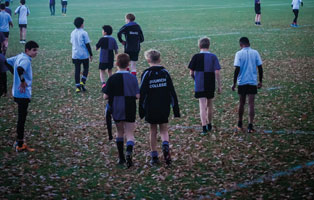
Deeply embedded in articles on what makes a good school you may find a short paragraph on its provision for the ordinary pupil, but that genus deserves further attention. Some of the hardest work a school has to undertake is to care for the pupils who are seen, or perceive themselves, as ‘nothing special’.
Independent schools celebrate the plethora of opportunities available to their pupils but don’t always work hard enough to interrogate who is taking them up. Many a school will take too great a pride in what is achieved by the prodigies (who would have done well anywhere), and every decent school looks after its strugglers, but it’s in ‘the middle of the middle’ that there is most value to be added and most to be done. Schools are getting better at understanding the problems posed by the coasting or professedly unexceptional pupil.
There are six key questions for parents to ask of a school to make sure that it is alert to the issue.
Commendations need to be accessible not only to the élite, but for the improving pupils too, with the focus on effort over attainment. Pupils must be able to feel a pride in the progress they make in all their enterprises – the creative, sporting, charitable and adventurous as well as the academic. And schools should not underestimate the value of a mention in assembly or in the school magazine of somebody who doesn’t usually feature in despatches. A good school will employ strong tracking systems to distinguish the real middle from the false middle (i.e. the merely indolent or disengaged) and to establish aspirational target setting as a basis for conversations between tutors and all their pupils.
Pupils need to be sponsored by committed tutors and be well known to their housemasters and year heads. When you visit a school check that they know all their pupils well – and not just their stars or strugglers. A good tutor teases out the hopes and fears of every pupil and nudges the reluctant pupil towards engagement. A good tutor respects every pupil for who he or she is. Pupils want to feel cherished for who they are, not what the school wants them to be. The best tutors are also great role models: adults engaged in and supportive of the school and its ethos (albeit sometimes as critical friends). Form structure is important too; as many children as possible should have access to promotion on merit and there should be evidence that the school is cognisant of the danger of sink forms.
Parents might check up on just how many matches the lower ability teams play, how inclusive music and drama really are and how much the school’s clubs and societies engage all rather than some. I reflect on the boys at Dulwich who have found their platforms and niches at one remove from the mainstream: the boy with a love of reading who has led the book club and creative writing groups; the boy who struggles with ball sports but who in rowing has found a social life as well as a sport to enjoy; the boy who loves the theatre, not as an actor but in doing the lighting or sound. At an early age, there should be an opportunity for everyone to ‘be and do everything’. Junior school sport is judged by 100 per cent participation rather than by the win:lose ratio of A teams, while all boys in Years 3 and 4 learn to play a stringed instrument and a wind instrument. Meanwhile, at the top of the school, you might want to check that school colours are awarded to those who shine in community service or the CCF as well as in sport and that the school’s senior prefects represent a cross-section of the school population.
Tutors should be sending a variety of pupils to school council meetings or learning forums and sometimes sending the more reluctant, those out of their comfort zone, as representing ‘the middle voice’. It is also important to enable leadership opportunities for the non-stellar pupil; to find an alternative engagement for those disappointed not to become prefects.
A good house system, like a good housemaster or housemistress, can elicit a strong sense of community and co-operation and provide an opportunity for all to shine through a wide range of competitions (cultural as well as sporting). In a good house, strong peer relationships and the right kind of peer pressure encourage all boarders to engage and lead activity. Peer mentoring creates opportunities for boarders to learn from each other’s struggles and achievements. In a boarding setting particularly pupils can ably support each other’s learning. A key to success in a boarding house as in a school is the scope of its prevailing culture. So, if there is a belief that hard work and enthusiasm is at the heart of success, the middle group will accept that.
Only excellent and flexible teaching can ensure that all pupils are equally challenged. The best teachers are those who can portray academic struggle as a learning opportunity, ensuring that pupils do not seek to hide in the anonymous middle ground for fear of getting things wrong. Embracing free learning rather than creating a curriculum that is wholly exam focused also ensures that middling pupils are engaged, by creating different fields in which they can be noticed. Good schools tend to have more parents’ evenings that allow for discussion of progress and wellbeing between the teachers, parents and the pupils themselves.
Every child matters; every child differs. Of course, it’s inevitable that some teachers will be drawn to those who shine brightest. A school has to work hard to draw out the ‘middle of the middle’ so they can excel too, but it’s always worth the effort.
Subscribe / latest articles and news from our schools